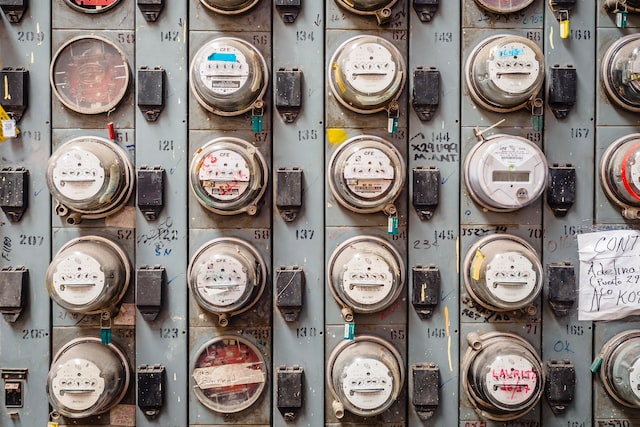Introduction – Electric Bills Are A Big Expense
Electric bills are often the largest expense of running a home. You have to pay your monthly bills to have a constant energy supply in your home. When costs are high, one problem is becoming late on your bill. So how late can you be on your electric bill?
Late payments incur late fees which result in serious consequences like higher interest rates or disconnection of service.
How Late Can You Be On Your Electric Bill?
When paying your electric bill, most utilities have policies that indicate when they consider a bill late.
For example, some will send out an overdue warning if the balance is not paid within a certain time frame after the billing date.

Depending on the utility’s policy, you could face penalties such as late fees, interest charges, or even a shut-off of service if you don’t pay your electric bill on time.
Here we put together the length of delay in payment and potential scenarios undertaken by the electricity supplier. We broke apart the responses into public utilities vs private suppliers. In deregulated markets there are for-profit private suppliers.
How Late Is Payment On Electric Bill – Public Utility
| Duration of Lateness | Potential Scenario | Potential Action Taken by Utility |
|---|---|---|
| A few days | Minor delay due to oversight or error | Reminder notification sent to customer. No additional late fee or minimal fee imposed |
| 1 week | Payment forgotten or delayed | Second reminder sent. Small late fee imposed. Option to set up a payment plan may be offered |
| 1 month | Financial difficulties or neglect | Formal notice of non-payment sent. Higher late fee imposed; Potential payment plan or financial assistance resources provided – Warning of potential disconnection |
| Many months | Continued non-payment | Multiple notices sent. Highest late fees imposed. Disconnection warning or actual disconnection- Referral to debt collection agency- Requirement of a deposit or prepayment for future service reconnection |
How Late Is Payment On Electric Bill – Private Supplier
| Duration of Lateness | Potential Scenario | Potential Action Taken by Supplier |
|---|---|---|
| A few days | Minor delay due to oversight or error | Reminder notification sent to customer. Minimal or standard late fee imposed |
| 1 week | Payment forgotten or delayed | Second reminder or formal notice sent. Increased late fee. Possible promotional offers for immediate payment or automatic payment setup |
| 1 month | Financial difficulties or neglect | Warning notice of potential disconnection. Accumulated late fees. Possible suspension of promotional rates or benefits. Offer for payment plan but with stricter terms |
| Many months | Continued non-payment | Disconnection notice or actual disconnection. Referral to a debt collection agency. Requirement of a deposit or substantial prepayment for future service reconnection. Possible termination of the contract. |
Public Utility Vs Private Supplier Of Electricity
Note that we broke down the late scenarios into two types of companies the reason being that the mission of the companies are different and therefore their response to late payments differ.
Public Utility
- Purpose & Structure: Public utilities are typically non-profit entities, owned by the local, state, or national government, or a combination thereof. Their primary purpose is to provide essential services to all residents of a particular area at reasonable rates.
- Late Payment Policy:
- Flexibility: Given their public service mission, public utilities might be more lenient or flexible with late payments, especially if the customer has a genuine reason. There might be provisions to set up payment plans or extensions.
- Fees: While late fees are common, they might be regulated or standardized to ensure fairness and affordability. These fees might be lower than those of private companies.
- Disconnection: Public utilities often have to follow strict guidelines before disconnecting a customer due to non-payment. There might be requirements for multiple notifications, opportunities for the customer to contest or seek assistance, and special considerations during extreme weather conditions or public emergencies.
- Assistance Programs: Public utilities often have programs or partnerships with local agencies to assist low-income customers or those facing financial hardships. These programs might help customers pay off their bills or provide them with resources and tools to manage their energy usage.
Private Supplier
- Purpose & Structure: Private suppliers are typically for-profit entities that operate in areas where the electricity market has been deregulated. Their goal is to make a profit while competing for customers.
- Late Payment Policy:
- Flexibility: Private suppliers might be less flexible when it comes to late payments. Their primary concern is profitability, so they might enforce stricter deadlines and terms.
- Fees: Late fees can vary, and sometimes they might be higher than those imposed by public utilities. This is especially true if competition is low or if the supplier feels that their service offers value above and beyond standard electricity provision.
- Disconnection: While they still have to adhere to local regulations, private suppliers might be quicker to disconnect service after missed payments. They often have more autonomy in their decision-making processes.
- Assistance Programs: While some private suppliers might offer hardship programs or assistance, it might not be as widespread or as robust as those offered by public utilities. Their primary motivation is profit, so these programs might be less emphasized unless mandated by regulations or seen as a competitive advantage.
What Happens If You’re Late On Your Electric Bill?
Most utility companies offer a few days of leniency on bill payments without penalties but advise paying promptly. Not paying by the due date can result in late fees, service disconnection, or an account hold until the bill is settled.
A typical grace period is 30 days. After this, unpaid bills might incur late fees, the specifics of which vary by company. To get details, contact your utility provider.
Paying your bill on time helps avoid fees and penalties. If unable to pay, it’s essential to communicate with your utility company to discuss possible arrangements. Penalties might start accruing from the day after the due date, including additional fees and interest.
In extreme cases, some utilities send legal notices about payment delinquencies and potential service disconnection. Always monitor due dates and pay on time. If facing financial challenges, most companies are willing to assist with payment plans.
How To Avoid Being Late On Your Electric Bill?

Avoiding late payments on your electric bills requires a combination of effective financial planning, utilizing technology, and staying informed. Here are some strategies:
1. Automated Payments: Set up automatic payments through your utility provider’s website or app. This ensures your bills are paid on time, reducing the risk of late fees and service interruptions. Examples of these include the following:
- AvidUtility by AvidXchange: An automated utility consumption analysis and payment processing solution that reduces the manual work involved in handling utility invoices.
- Urjanet Utility Data Platform: Provides automated access to utility bill data and streamlines utility bill processing to help avoid late fees.
- Vervantis Utility Bill Management: Automates the collection and on-time payment of invoices, and resolves billing queries and payment exceptions.
2. Payment Reminders: Take advantage of payment reminders via emails or text messages from your utility company to stay informed about upcoming due dates. An example a software tool is Invoicera, a cloud-based utility billing software that provides automated billing, payment reminders, and report management feature and geared towards small businesses or freelancers.
3. Financial Planning: Create a monthly budget that prioritizes essential expenses, including utility bills. Ensure you allocate funds to cover these costs before spending on non-essential items.
4. Emergency Fund: Build an emergency fund to cover unexpected expenses, ensuring that you can always pay your bills even if unforeseen financial challenges arise.
5. Stay Informed: Keep yourself updated with the billing cycles, policies, and any changes in the payment terms of your utility provider to avoid surprises.
What To Do If You’re Already Late On Your Electric Bill?
If you’re already behind on your electric bill, don’t panic – there are several steps to get back on top. First and foremost, never ignore the issue: contact your provider immediately and explain your situation.
They might be willing to work out an installment plan that gets you back on track without breaking your budget.
If an installment plan isn’t feasible, request an extension or inquire about smart payment plans that may shorten the time needed to catch up.
You may also want to look into opening a Line of Credit with your energy company, as they often offer preferred rates to existing customers.
Finally, if you are having trouble covering the entire balance due right away, consider talking to one of the many third-party lending companies that specialize in funding consumer delinquent utility bills.
These services often provide more reasonable repayment terms than providers.
Tips For Reducing Your Electric Bill
Reducing your electric bill can be an intimidating aspect of budgeting. Yet, with thoughtful research and dedication to making necessary changes, you can drastically decrease your electricity costs in no time.
One tip to reduce your electric bill is to lower the temperature of your thermostat during the summer months, especially at night.
Doing this will not only cool the house down while you sleep but also save on your electric bills since AC systems use a lot of energy when running. Unplug any electronics or appliances that are not in use.
Even though they’re switched off, devices still draw small amounts of power–meaning it shows up in the form of dollars on your monthly bill!
Furthermore, ensure all windows and doors are sealed properly to prevent air from escaping.
This greatly reduces the energy used by climate-control systems and creates more efficient air circulation patterns in the household.
By taking the initiative and following these steps to reduce electricity expenses, you’ll be able to create a more comfortable living experience without breaking the bank.
Wrapping Up
In conclusion, it’s not bad to be a little late. Address the problem proactively by setting up automatic payments and taking advantage of payment reminders is key.
If you’re already late on your electric bill, don’t panic – contact your provider and inquire about installment plans or third-party lending services.
Finally, reducing your electric bills can be done quickly by lowering the thermostat temperature, unplugging electronics when not in use, and sealing windows/doors properly.
These steps will help create a more comfortable living experience while saving you money.

I need to get my acct number